Psychological interventions for depression and anxiety in patients with coronary heart disease, heart failure or atrial fibrillation
- PMID: 38577875
- PMCID: PMC10996021
- DOI: 10.1002/14651858.CD013508.pub3
Psychological interventions for depression and anxiety in patients with coronary heart disease, heart failure or atrial fibrillation
Abstract
Background: Depression and anxiety occur frequently (with reported prevalence rates of around 40%) in individuals with coronary heart disease (CHD), heart failure (HF) or atrial fibrillation (AF) and are associated with a poor prognosis, such as decreased health-related quality of life (HRQoL), and increased morbidity and mortality. Psychological interventions are developed and delivered by psychologists or specifically trained healthcare workers and commonly include cognitive behavioural therapies and mindfulness-based stress reduction. They have been shown to reduce depression and anxiety in the general population, though the exact mechanism of action is not well understood. Further, their effects on psychological and clinical outcomes in patients with CHD, HF or AF are unclear.
Objectives: To assess the effects of psychological interventions (alone, or with cardiac rehabilitation or pharmacotherapy, or both) in adults who have a diagnosis of CHD, HF or AF, compared to no psychological intervention, on psychological and clinical outcomes.
Search methods: We searched the CENTRAL, MEDLINE, Embase, PsycINFO and CINAHL databases from 2009 to July 2022. We also searched three clinical trials registers in September 2020, and checked the reference lists of included studies. No language restrictions were applied.
Selection criteria: We included randomised controlled trials (RCTs) comparing psychological interventions with no psychological intervention for a minimum of six months follow-up in adults aged over 18 years with a clinical diagnosis of CHD, HF or AF, with or without depression or anxiety. Studies had to report on either depression or anxiety or both.
Data collection and analysis: We used standard Cochrane methods. Our primary outcomes were depression and anxiety, and our secondary outcomes of interest were HRQoL mental and physical components, all-cause mortality and major adverse cardiovascular events (MACE). We used GRADE to assess the certainty of evidence for each outcome.
Main results: Twenty-one studies (2591 participants) met our inclusion criteria. Sixteen studies included people with CHD, five with HF and none with AF. Study sample sizes ranged from 29 to 430. Twenty and 17 studies reported the primary outcomes of depression and anxiety, respectively. Despite the high heterogeneity and variation, we decided to pool the studies using a random-effects model, recognising that the model does not eliminate heterogeneity and findings should be interpreted cautiously. We found that psychological interventions probably have a moderate effect on reducing depression (standardised mean difference (SMD) -0.36, 95% confidence interval (CI) -0.65 to -0.06; 20 studies, 2531 participants; moderate-certainty evidence) and anxiety (SMD -0.57, 95% CI -0.96 to -0.18; 17 studies, 2235 participants; moderate-certainty evidence), compared to no psychological intervention. Psychological interventions may have little to no effect on HRQoL physical component summary scores (PCS) (SMD 0.48, 95% CI -0.02 to 0.98; 12 studies, 1454 participants; low-certainty evidence), but may have a moderate effect on improving HRQoL mental component summary scores (MCS) (SMD 0.63, 95% CI 0.01 to 1.26; 12 studies, 1454 participants; low-certainty evidence), compared to no psychological intervention. Psychological interventions probably have little to no effect on all-cause mortality (risk ratio (RR) 0.81, 95% CI 0.39 to 1.69; 3 studies, 615 participants; moderate-certainty evidence) and may have little to no effect on MACE (RR 1.22, 95% CI 0.77 to 1.92; 4 studies, 450 participants; low-certainty evidence), compared to no psychological intervention.
Authors' conclusions: Current evidence suggests that psychological interventions for depression and anxiety probably result in a moderate reduction in depression and anxiety and may result in a moderate improvement in HRQoL MCS, compared to no intervention. However, they may have little to no effect on HRQoL PCS and MACE, and probably do not reduce mortality (all-cause) in adults who have a diagnosis of CHD or HF, compared with no psychological intervention. There was moderate to substantial heterogeneity identified across studies. Thus, evidence of treatment effects on these outcomes warrants careful interpretation. As there were no studies of psychological interventions for patients with AF included in our review, this is a gap that needs to be addressed in future studies, particularly in view of the rapid growth of research on management of AF. Studies investigating cost-effectiveness, return to work and cardiovascular morbidity (revascularisation) are also needed to better understand the benefits of psychological interventions in populations with heart disease.
Copyright © 2024 The Authors. Cochrane Database of Systematic Reviews published by John Wiley & Sons, Ltd. on behalf of The Cochrane Collaboration.
Conflict of interest statement
CFS has declared that she has no known conflicts of interest. RST is a former editor of Cochrane Heart. He was not involved in the editorial process for the review. KMG has declared that she has no known conflicts of interest. JDL has declared that he has no known conflicts of interest. DRT has declared that he has no known conflicts of interest. SHR is first author and methodological lead for a clinical trial included within this review (Richards 2018); the University of Exeter was the lead centre commissioned to conduct the research. The CADENCE study was funded by the UK National Institute of Health Research Health Technology Assessment Programme (project 12/189/06): the funder was not involved in the design, delivery or analysis of the CADENCE study. SHR was not involved in assessing the eligibility of this study, nor in the data extraction, risk of bias assessment or grading of the certainty of the evidence. LL has declared that she has no known conflicts of interest.
Figures
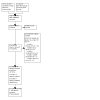

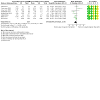
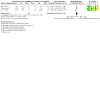
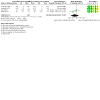
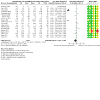
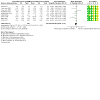
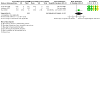
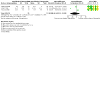
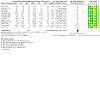
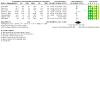
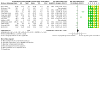
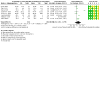
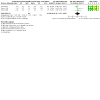
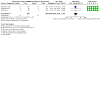
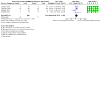
Update of
References
References to studies included in this review
Agren 2012 {published data only}
-
- Agren S, Evangelista LS, Hjelm C, Stromberg A. Dyads affected by chronic heart failure: a randomized study evaluating effects of education and psychosocial support to patients with heart failure and their partners. Journal of Cardiac Failure 2012;18(5):359-66. [DOI: 10.1016/j.cardfail.2012.01.014] - DOI - PMC - PubMed
-
- Liljeroos M, Agren S, Jaarsma T, Arestedt K, Stromberg A. Long term effects of an integrated educational and psychosocial intervention in patient-partner dyads affected by heart failure. European Heart Journal Supplement 1 2012;33:954‐5. [DOI: 10.1093/eurheartj/ehs284] - DOI
Bekelman 2018 {published and unpublished data}
-
- Bekelman D, Allen L, Hattler B, Havranek EP, Fairclough D, McBryde CF, et al. Collaborative care to alleviate symptoms and adjust to illness (CASA): primary efficacy results from the CASA randomized clinical trial of a palliative symptom and psychosocial care intervention in heart failure. Journal of General Internal Medicine 2017;32(2):S141‐2. [DOI: 10.1007/s11606-017-4028-8] - DOI
-
- Bekelman D, Allen L, Hattler B, Havranek, E, Fairclough D, McBryde C, et al. Primary results from the collaborative care to alleviate symptoms and adjust to illness in heart failure (CASA) randomized clinical trial. Journal of Pain and Symptom Management 2017;53(2):328‐9. [DOI: 10.1016/j.jpainsymman.2016.12.053] - DOI
-
- Bekelman DB, Allen LA, McBryde CF, Hattler B, Fairclough DL, Havranek EP, et al. Effect of a collaborative care intervention vs usual care on health status of patients with chronic heart failure: the CASA randomized clinical trial. JAMA Internal Medicine 2018;178(4):511-9. [DOI: 10.1001/jamainternmed.2017.8667] - DOI - PMC - PubMed
Chair 2013 {published data only}
-
- Chair SY, Chan SW, Thompson DR, Leung KP, Ng SK, Choi KC. Long-term effect of motivational interviewing on clinical and psychological outcomes and health-related quality of life in cardiac rehabilitation patients with poor motivation in Hong Kong: a randomized controlled trial. Clinical Rehabilitation 2013;27(12):1107-17. [DOI: 10.1177/0269215513490527] - DOI - PubMed
-
- Chair SY, Chan SW, Thompson DR, Leung KP, Ng SK, Choi KC. Short-term effect of motivational interviewing on clinical and psychological outcomes and health-related quality of life in cardiac rehabilitation patients with poor motivation in Hong Kong: a randomized controlled trial. European Journal of Preventive Cardiology 2012;19(6):1383-92. [DOI: 10.1177/1741826711425428] - DOI - PubMed
Chang 2020 {published data only}
-
- Chang Z, Guo AQ, Zhou AX, Sun TW, Ma L, Gardiner FW, et al. Nurse-led psychological intervention reduces anxiety symptoms and improves quality of life following percutaneous coronary intervention for stable coronary artery disease. Australian Journal of Rural Health 2020;28(2):124-31. [DOI: 10.1111/ajr.12587] - DOI - PubMed
Crossmann 2010 {published data only}
-
- Crossmann A, Schulz SM, Kuhlkamp V, Ritter O, Neuser H, Schumacher B, et al. A randomized controlled trial of secondary prevention of anxiety and distress in a German sample of patients with an implantable cardioverter defibrillator. Psychosomatic Medicine 2010;72(5):434-41. [DOI: 10.1097/PSY.0b013e3181d9bcec] - DOI - PubMed
Davidson 2010 {published data only}
-
- Davidson KW, Rieckmann N, Clemow L, Schwartz JE, Shimbo D, Medina V, et al. Enhanced depression care for patients with acute coronary syndrome and persistent depressive symptoms: coronary psychosocial evaluation studies randomized controlled trial. Archives of Internal Medicine 2010;170(7):600-8. [DOI: 10.1001/archinternmed.2010.29] - DOI - PMC - PubMed
Freedland 2009 {published data only}
Gary 2010 {published data only}
Habibovic 2017 {published data only}
-
- Habibović M, Denollet J, Cuijpers P, Spek VR, den Broek KC, Warmerdam L, et al. E-health to manage distress in patients with an implantable cardioverter-defibrillator: primary results of the WEBCARE trial. Psychosomatic Medicine 2014 ;76(8):593-602. [DOI: 10.1097/PSY.0000000000000096] - DOI - PubMed
-
- Pedersen SS, Spek V, Theuns DA, Alings M, Voort P, Jordaens L, et al. Rationale and design of WEBCARE: a randomized, controlled, web-based behavioral intervention trial in cardioverter-defibrillator patients to reduce anxiety and device concerns and enhance quality of life. Trials 2009;10:120. [DOI: 10.1186/1745-6215-10-120] - DOI - PMC - PubMed
Humphries 2021 {published data only}
-
- Humphries SM, Wallert J, Norlund F, Held C, Olsson E. 12-month follow-up of the U-CARE heart trial: using internet-based cognitive behavioural therapy to treat patients experiencing depression and anxiety after myocardial infarction. Psychotherapy and Psychosomatics 2019;S88:58. [DOI: 10.1159/000502467] - DOI
-
- Humphries SM, Wallert J, Norlund F, Wallin E, Burell G, Essen L, et al. Internet-based cognitive behavioral therapy for patients reporting symptoms of anxiety and depression after myocardial infarction: U-CARE heart randomized controlled trial twelve-month follow-up. Journal of Medical Internet Research 2021;23(5):e25465. [DOI: 10.2196/25465] - DOI - PMC - PubMed
Moradi 2016 {published data only}
-
- Moradi M, Zeighami R, Moghadam MB, Javadi HR, Alipor M. Anxiety treatment by eye movement desensitization and reprocessing in patients with myocardial infarction. Iranian Red Crescent Medical Journal 2016;18(12):e27368. [DOI: 10.5812/ircmj.27368] - DOI
Nahlėn Bose 2016 {published and unpublished data}
-
- Nahlén Bose CN, Persson H, Björling G, Ljunggren G, Elfström ML, Saboonchi F. Evaluation of a coping effectiveness training intervention in patients with chronic heart failure - a randomized controlled trial. European Journal of Cardiovascular Nursing 2016;15(7):537-48. [DOI: 10.1177/1474515115625033] - DOI - PubMed
-
- Nahlėn Bose C, Bjorling G, Elfstrom ML, Persson H, Saboonchi F. Implementation of coping effectiveness training in patients with chronic heart failure: participants evaluations indicate psychosocial benefits. European Journal of Cardiovascular Nursing 2015;14(Suppl 1):S10. [DOI: 10.1177/1474515115579615] - DOI - PubMed
Nijjar 2019 {published data only}
O'Neil 2014a {published data only}
-
- O'Neil A, Hawkes AL, Chan B, Sanderson K, Forbes A, Hollingsworth B, et al. A randomised, feasibility trial of a tele-health intervention for acute coronary syndrome patients with depression ('MoodCare'): study protocol. BMC Cardiovascular Disorders 2011;11:8. [DOI: 10.1186/1471-2261-11-8] - DOI - PMC - PubMed
-
- O'Neil A, Taylor B, Hare DL, Sanderson K, Cyril S, Venugopal K, et al. Long-term efficacy of a tele-health intervention for acute coronary syndrome patients with depression: 12-month results of the MoodCare randomized controlled trial. European Journal of Preventive Cardiology 2015;22(9):1111-20. [DOI: 10.1177/2047487314547655] - DOI - PubMed
-
- O'Neil A, Taylor B, Sanderson K, Cyril S, Chan B, Hawkes AL, et al. Efficacy and feasibility of a tele-health intervention for acute coronary syndrome patients with depression: results of the "MoodCare" randomized controlled trial. Annals of Behavioral Medicine 2014;48(2):163-74. [DOI: 10.1007/s12160-014-9592-0] - DOI - PubMed
O'Neil 2014b {published data only}
-
- Hawkes AL, Atherton J, Taylor CB, Scuffham P, Eadie K, Miller NH, et al. Randomised controlled trial of a secondary prevention program for myocardial infarction patients ('ProActive Heart'): study protocol. Secondary prevention program for myocardial infarction patients. BMC Cardiovascular Disorders 2009;9:16. [DOI: 10.1186/1471-2261-9-16] - DOI - PMC - PubMed
Rafanelli 2020 {published data only}
-
- Rafanelli C, Gostoli S, Buzzichelli S, Guidi J, Sirri L, Gallo P, et al. Sequential combination of cognitive-behavioral treatment and well-being therapy in depressed patients with acute coronary syndromes: a randomized controlled trial (TREATED-ACS study). Psychotherapy and Psychosomatics 2020;89(6):345-56. [DOI: 10.1159/000510006] - DOI - PubMed
Richards 2018 {published and unpublished data}
-
- Richards SH, Campbell JL, Dickens C, Anderson R, Gandhi M, Gibson A, et al. Enhanced psychological care in cardiac rehabilitation services for patients with new-onset depression: the CADENCE feasibility study and pilot RCT. Health Technology Assessment 2018;22(30):1-220. [DOI: 10.3310/hta22300] - DOI - PMC - PubMed
-
- Richards SH, Dickens C, Anderson R, Richards DA, Taylor RS, Ukoumunne OC, et al. Assessing the effectiveness of enhanced psychological care for patients with depressive symptoms attending cardiac rehabilitation compared with treatment as usual (CADENCE): a pilot cluster randomised controlled trial. Trials 2018;19(1):211. [DOI: 10.1186/s13063-018-2576-9] - DOI - PMC - PubMed
-
- Richards SH, Dickens C, Anderson R, Richards DA, Taylor RS, Ukoumunne OC, et al. Assessing the effectiveness of enhanced psychological care for patients with depressive symptoms attending cardiac rehabilitation compared with treatment as usual (CADENCE): study protocol for a pilot cluster randomised controlled trial. Trials 2016;17:59. [DOI: 10.1186/s13063-016-1184-9] - DOI - PMC - PubMed
Tagney 2013 {published data only}
-
- Tagney J. A Randomised, Clinical Trial of a Psycho-Educational Nursing Intervention in Patients Receiving an Implantable Cardioverter Defibrillator [PhD thesis]. Bristol, UK: University of the West of England, 2013.
Turner 2014 {published data only}
-
- Murphy B, Higgins R, Worcester M, Elliott P, Navaratnam H, Mitchell F, et al. Group cognitive behaviour therapy for cardiac patients: results of a randomised controlled trial. Heart Lung and Circulation 2010;19(Suppl 2):S242. [DOI: 10.1016/j.hlc.2010.06.587] - DOI
-
- Murphy B, Worcester M, Higgins R, Turner A, Elliott P, Le Grande M, et al. Depressed cardiac patients improve with group cognitive behaviour therapy: results of a randomised controlled trial. Heart Lung and Circulation 2011;20(Suppl 2):S242. [DOI: 10.1016/j.hlc.2011.05.594] - DOI
-
- Murphy BM, Worcester MU, Higgins RO, Elliott PC, Le Grande MR, Mitchell F, et al. Reduction in 2-year recurrent risk score and improved behavioral outcomes after participation in the 'Beating Heart Problems' self-management program: results of a randomized controlled trial. Journal of Cardiopulmonary Rehabilitation and Prevention 2013;33(4):220-8. [DOI: 10.1097/HCR.0b013e31828c7812] - DOI - PubMed
-
- Worcester M, Murphy B, Turner A, Higgins R, Elliott P, Navaratnam H, et al. Cognitive behaviour therapy benefits depressed cardiac patients: results of a randomised controlled trial. European Heart Journal 2011;32(Suppl 1):A648. [DOI: 10.1093/eurheartj/ehr324] - DOI
Wells 2021 {published data only}
-
- Wells A, McNicol K, Reeves D, Salmon P, Davies L, Heagerty A, et al. Improving the effectiveness of psychological interventions for depression and anxiety in the cardiac rehabilitation pathway using group-based metacognitive therapy (PATHWAY Group MCT): study protocol for a randomised controlled trial. Trials 2018;19:215. [DOI: 10.1186/s13063-018-2593-8] - DOI - PMC - PubMed
-
- Wells A, Reeves D, Capobianco L, Heal C, Davies L, Heagerty A, et al. Improving the effectiveness of psychological interventions for depression and anxiety in cardiac rehabilitation: PATHWAY a single-blind, parallel, randomized controlled trial of group metacognitive therapy. Circulation 2021;144(1):23-33. [DOI: ] - PMC - PubMed
-
- Wells A, Reeves D, Heal C, Davies LM, Shields GE, Heagerty A, et al. Evaluating metacognitive therapy to improve treatment of anxiety and depression in cardiovascular disease: the NIHR funded PATHWAY research programme. Frontiers in Psychiatry 2022;13:886407. [DOI: 10.3389/fpsyt.2022.886407] - DOI - PMC - PubMed
References to studies excluded from this review
Agren 2015 {published data only}
Angermann 2012 {published data only}
-
- Angermann CE, Stork S, Gelbrich G, Faller H, Jahns R, Frantz S, et al, Competence Network Heart Failure. Mode of action and effects of standardized collaborative disease management on mortality and morbidity in patients with systolic heart failure: the Interdisciplinary Network for Heart Failure (INH) study. Circulation: Heart Failure 2012;5(1):25-35. [DOI: 10.1161/CIRCHEARTFAILURE.111.962969] - DOI - PubMed
Blasco 2012 {published data only}
-
- Blasco A, Carmona M, Fernández-Lozano I, Salvador CH, Pascual M, Sagredo PG, et al. Evaluation of a telemedicine service for the secondary prevention of coronary artery disease. Journal of Cardiopulmonary Rehabilitation & Prevention 2012;32(1):25-31. [DOI: 10.1097/HCR.0b013e3182343aa7] - DOI - PubMed
Camacho 2018 {published data only}
-
- Camacho EM, Davies LM, Hann M, Small N, Bower P, Chew-Graham C, et al. Long-term clinical and cost-effectiveness of collaborative care (versus usual care) for people with mental-physical multimorbidity: cluster-randomised trial. British Journal of Psychiatry 2018;213(2):456-63. [DOI: 10.1192/bjp.2018.70] - DOI - PMC - PubMed
Cao 2017 {published data only}
-
- Cao X. Effects of a Tailored Educational Intervention on Psychological, Physical Health, and Quality of Life in Chinese CHD Patients with Type D personality [PhD thesis]. Hong Kong: Chinese University of Hong Kong, 2017.
Elkoustaf 2019 {published data only}
-
- Elkoustaf RA, Aldaas OM, Batiste CD, Mercer A, Robinson M, Newton D, et al. Lifestyle interventions and carotid plaque burden: a comparative analysis of two lifestyle intervention programs in patients with coronary artery disease. Permanente Journal 2019;23(18):196. [DOI: 10.7812/TPP/18.196] - DOI - PMC - PubMed
Eraballi 2018 {published data only}
-
- Eraballi A, Raghuram N, Ramarao NH, Pradhan B, Rao PV. Yoga based lifestyle program in improving quality of life after coronary artery bypass graft surgery: a randomised controlled trial. Journal of Clinical and Diagnostic Research 2018;12(3):YC05-9. [DOI: 10.7860/JCDR/2017/30296.11303] - DOI
Grady 2014 {published data only}
-
- Grady KL, Leon CF, Kozak AT, Cursio JF, Richardson D, Avery, et al. Does self-management counseling in patients with heart failure improve quality of life? Findings from the Heart Failure Adherence and Retention Trial (HART). Quality of Life Research 2014;23(1):31-8. [DOI: 10.1007/s11136-013-0432-7] - DOI - PMC - PubMed
He 2019 {published data only}
-
- He J, Dai F, Liao H, Fan J. Effect of individualized nursing intervention after percutaneous coronary intervention. International Journal of Clinical and Experimental Medicine 2019;12(6):7434-41.
Herrmann‐Lingen 2016 {published data only}
-
- Herrmann-Lingen C, Beutel ME, Bosbach A, Deter HC, Fritzsche K, Hellmich M, et al. A stepwise psychotherapy intervention for reducing risk in coronary artery disease (SPIRR-CAD): results of an observer-blinded, multicenter, randomized trial in depressed patients with coronary artery disease. Psychosomatic Medicine 2016;78(6):704-15. [DOI: 10.1097/PSY.0000000000000332] - DOI - PubMed
Huffman 2019 {published data only}
-
- Huffman JC, Feig EH, Millstein RA, Freedman M, Healy BC, Chung W, et al. Usefulness of a positive psychology-motivational interviewing intervention to promote positive affect and physical activity after an acute coronary syndrome. American Journal of Cardiology 2019;123(12):1906-14. [DOI: 10.1016/j.amjcard.2019.03.023] - DOI - PMC - PubMed
Jo 2014 {published data only}
-
- Jo GJ, Yang JH. Development and evaluation of a self care education program for elderly patients with percutaneous coronary intervention. Journal of Korean Academic Society of Nursing Education 2014;20(2):266‐75.
Kadda 2015 {published data only}
Karbasdehi 2018 {published data only}
-
- Karbasdehi ER, Abolghasemi A, Karbasdehi FR. The effectiveness of schema therapy integrated with rehabilitation on cognitive emotion regulation and existential anxiety in patients with congestive heart failure. Journal of Contemporary Psychotherapy 2018;48(4):233-9. [DOI: 10.1007/s10879-018-9390-2] - DOI
Katon 2010 {published data only}
Keeping 2010 {published data only}
-
- Keeping LM. Bridging the Transition from Hospital-to-Home: Effects of the VITAL Telehealth Program on Recovery in Coronary Artery Bypass Graft Surgery Patients and their Caregivers [PhD thesis]. Montreal, Quebec: McGill University, 2010.
Meindersma 2017 {published data only}
Morgan 2013 {published data only}
Moulaert 2013 {published data only}
-
- Moulaert V, Van Heugten C, Winkens B, Bakx W, De Krom M, Gorgels A, et al. New psychosocial intervention improves quality of life after cardiac arrest: results of a randomised controlled trial. Resuscitation 2013;84(1):S1‐2. [DOI: 10.1016/j.resuscitation.2013.08.020] - DOI
Navidian 2017 {published data only}
-
- Navidian A, Mobaraki Hajar, Shakiba M. The effect of education through motivational interviewing compared with conventional education on self-care behaviors in heart failure patients with depression. Patient Education and Counseling 2017;100(8):1499-504. [DOI: 10.1016/j.pec.2017.02.023] - DOI - PubMed
Nyklicek 2012 {published data only}
-
- Nyklicek I, Dijksman SC, Fonteijn W, Koolen JJ. Psychological and physiological effects of mindfulness interventions in cardiac patients after PCI: a randomized controlled trial. Psychosomatic Medicine 2012;74(3):A70‐1. [DOI: 10.1097/PSY.0b013e3182583b27] - DOI
O'Doherty 2015 {published data only}
-
- O'Doherty V, Carr A, McGrann A, O'Neill JO, Dinan S, Graham I, et al. A controlled evaluation of mindfulness-based cognitive therapy for patients with coronary heart disease and depression. Mindfulness 2015;6(3):405-16. [DOI: 10.1007/s12671-013-0272-0] - DOI
Park 2015 {published data only}
Raghuram 2014 {published data only}
-
- Raghuram N, Parachuri RV, Swarnagowri MV, Babu S, Chaku R, Kulkarni R, et al. Yoga based cardiac rehabilitation after coronary artery bypass surgery: one-year results on LVEF, lipid profile and psychological states - a randomized controlled study. Indian Heart Journal 2014;66(5):490-502. [DOI: 10.1016/j.ihj.2014.08.007] - DOI - PMC - PubMed
Russell 2015 {published data only}
Salmoirago Blotcher 2011 {published data only}
Salzwedel 2019 {published data only}
-
- Salzwedel A, Wegscheider K, Schulz-Behrendt C, Dorr G, Reibis R, Voller H. No impact of an extensive social intervention program on return to work and quality of life after acute cardiac event: a cluster-randomized trial in patients with negative occupational prognosis. International Archives of Occupational & Environmental Health 2019;92(8):1109-20. [DOI: 10.1007/s00420-019-01450-3] - DOI - PubMed
Schneider 2019 {published data only}
-
- Schneider RH, Myers HF, Marwaha K, Rainforth MA, Salerno JW, Nidich SI, et al. Stress reduction in the prevention of left ventricular hypertrophy: a randomized controlled trial of transcendental meditation and health education in hypertensive African Americans. Ethnicity and Disease 2019;29(4):577-86. [DOI: 10.18865/ed.29.4.577] - DOI - PMC - PubMed
Serber 2016 {published data only}
-
- Serber ER, Fava JL, Christon LM, Buxton AE, Goldberger JJ, Gold MR, et al. Positive psychotherapy to improve autonomic function and mood in ICD patients (PAM-ICD): rationale and design of an RCT currently underway. Pacing & Clinical Electrophysiology 2016;39(5):458-70. [DOI: 10.1111/pace.12820] - DOI - PMC - PubMed
Sherwood 2011 {published data only}
-
- Sherwood A, O'Connor CM, Routledge FS, Hinderliter AL, Watkins LL, Babyak MA, et al. Coping effectively with heart failure (COPE-HF): design and rationale of a telephone-based coping skills intervention. Journal of Cardiac Failure 2011;17(3):201-7. [DOI: 10.1016/j.cardfail.2010.11.001] - DOI - PMC - PubMed
Smagula 2019 {published data only}
Spindler 2019 {published data only}
-
- Spindler H, Leerskov K, Joensson K, Nielsen G, Andreasen JJ, Dinesen B. Conventional rehabilitation therapy versus telerehabilitation in cardiac patients: a comparison of motivation, psychological distress, and quality of life. International Journal of Environmental Research & Public Health 2019;16(3):12. [DOI: 10.3390/ijerph16030512] - DOI - PMC - PubMed
Sullivan 2009 {published data only}
-
- Sullivan MJ, Wood L, Terry J, Brantley J, Charles A, McGee V, et al. The Support, Education, and Research in Chronic Heart Failure Study (SEARCH): a mindfulness-based psychoeducational intervention improves depression and clinical symptoms in patients with chronic heart failure. American Heart Journal 2009;157(1):84-90. [DOI: 10.1016/j.ahj.2008.08.033] - DOI - PubMed
Taghadosi 2014 {published data only}
-
- Taghadosi M, Rohollah F, Aghajani M, Raygan F. Effect of cognitive therapy on mental health in patients with heart failure. Feyz Medical Sciences Journal 2014;18(1):52-9. [URL: feyz.kaums.ac.ir/article-1-2196-en.html]
Tyrer 2014 {published data only}
Uysal 2012 {published data only}
Yardımcı 2017 {published data only}
Yudi 2017 {published data only}
-
- Yudi M, Clark D, Tsang D, Jelinek M, Kalten K, Joshi S, et al. Smartphone-based, early cardiac rehabilitation in patients with acute coronary syndromes: a randomised controlled trial. Heart Lung and Circulation 2017;26(Suppl 1):S349. [DOI: 10.1016/j.hlc.2017.06.710] - DOI
Zeighami 2018 {published data only}
-
- Zeighami R, Behnammoghadam M, Moradi M, Bashti S. Comparison of the effect of eye movement desensitization reprocessing and cognitive behavioral therapy on anxiety in patients with myocardial infarction. European Journal of Psychiatry 2018;32(2):72-6. [DOI: 10.1016/j.ejpsy.2017.09.001] - DOI
Zuidersma 2013 {published data only}
-
- Zuidersma M, Conradi HJ, Melle JP, Ormel J, Jonge P. Depression treatment after myocardial infarction and long-term risk of subsequent cardiovascular events and mortality: a randomized controlled trial. Journal of Psychosomatic Research 2013;74(1):25-30. [DOI: 10.1016/j.jpsychores.2012.08.015] - DOI - PubMed
References to studies awaiting assessment
Eckert 2010 {published data only}
-
- Eckert K, Schrader G, Wilkinson D, Askew D, Dick M, Wade T, et al. Detection and management of depression in patients with chronic heart disease: the take heart in primary care cluster randomised controlled trial. Heart Lung and Circulation 2010;19(Suppl 2):S240‐1. [DOI: 10.1016/j.hlc.2010.06.584] - DOI
Gu 2017a {published data only}
-
- Gu Y, Zhu Y. Effects of mindfulness-based stress reduction on markers of cardiovascular risk in patients with ischemic heart disease: a randomized controlled trial. Journal of the American College of Cardiology 2017;70(Suppl 16):C162. [ABSTRACT NUMBER: GW28-e0500] [DOI: 10.1016/j.jacc.2017.07.592] - DOI
Oranta 2010 {published data only}
-
- Oranta O, Luutonen S, Salokangas RKR, Vahlberg T, Leino-Kilpi H. Nurse-led interpersonal counseling for depressive symptoms in patients with myocardial infarction. Cardiology 2013;126(Suppl 2):103. [DOI: 10.1159/000355890] - DOI
Sobczak 2016 {published data only}
-
- Sobczak M, Qawoq H, Krawczyk M, Kasprzak JD. Effects of cognitive behavioral therapy in cardiac electrotherapy device recipients. European Heart Journal 2016;37(Suppl 1):684. [DOI: 10.1093/eurheartj/ehw433] - DOI
-
- Sobczak-Kaleta MA, Qawoq HD, Krawczyk M, Wierzbowska-Drabik K, Kasprzak JD. Cognitive behavioral intervention improves quality of life and perceived illness acceptance in patients after cardiac electrotherapy devices implantation. Psychiatria Polska 2019;53(5):1037-51. [DOI: 10.12740/PP/109217] - DOI - PubMed
Spruill 2021 {published data only}
-
- Spruill TM, Park C, Kalinowski J, Shallcross AJ, Visvanathan P, Arabadjian ME, et al. Telephone-based stress management in women with myocardial infarction: findings from the Go Red for Women strategically focused research network. Circulation 2021;144(Suppl 1):A10596. [ABSTRACT NUMBER: 10596] [DOI: 10.1161/circ.144.suppl_1.10596] - DOI
References to ongoing studies
Chung 2014 {published data only}
-
- Chung ML, Lennie TA, Moser DK. The feasibility of the family cognitive educational intervention to improve depressive symptoms and quality of life in patients with heart failure and their family caregivers. Journal of Cardiac Failure 2014;20(8):S52. [DOI: 10.1016/j.cardfail.2014.06.148] - DOI
Holdgaard 2021 {published data only}
-
- Holdgaard A, Eckhardt-Hansen C, Lund T, Lassen CF, Sibiliz KL, Høfsten DE, et al. Intensive group-based cognitive therapy in patients with cardiac disease and psychological distress - a randomized controlled trial protocol. Trials 2021;22(1):455. [DOI: 10.1186/s13063-021-05405-3] - DOI - PMC - PubMed
ISRCTN33129243 {published data only}
-
- ISRCTN33129243. Cognitive behavioural therapy to reduce anxiety and depression in atrial fibrillation (CBT-AF). www.isrctn.com/ISRCTN33129243 (first received 25 May 2017). [DOI: 10.1186/ISRCTN33129243] - DOI
Moser 2012a {published data only}
-
- Moser DK, Wu JR, Chung ML, Biddle MJ, Schooler M, Lenni TA. Randomized controlled trial of a biobehavioral intervention for depression in patients with heart failure. Journal of Cardiac Failure 2012;18(8):S69. [DOI: 10.1016/j.cardfail.2012.06.459] - DOI
NCT04986969 {published data only}
-
- NCT04986969. Online cognitive behavioral therapy for depressive symptoms in rural patients with cardiac disease (COMBAT-DS) [Online cognitive behavioral therapy for depressive symptoms in rural patients with coronary heart disease]. clinicaltrials.gov/ study/NCT04986969 (first received 2 August 2021). [CLINICALTRIALS.GOV ID: NCT04986969]
Additional references
Anderson 2014
Anderson 2016
Asberg 1978
BACPR 2023
-
- British Association for Cardiovascular Prevention and Rehabilitation. The BACPR standards and core components for cardiovascular disease prevention and rehabilitation 2023. 4th edition. London: British Cardiovascular Society, 2023.
Barkowski 2020
Bauer 2012
-
- Bauer LK, Caro MA, Beach SR, Mastromauro CA, Lenihan E, Januzzi JL, et al. Effects of depression and anxiety improvement on adherence to medication and health behaviors in recently hospitalized cardiac patients. American Journal of Cardiology 2012;109(9):1266-71. [DOI: 10.1016/j.amjcard.2011.12.017] - DOI - PubMed
Baumeister 2015
Beck 1961
Beck 1988
Beck 1996
-
- Beck AT, Steer RA, Brown GK. Manual for the Beck Depression Inventory-II. 1st edition. San Antonio, TX: Psychological Corporation, 1996.
Bedford 1976
Benjamin 2017
BHF 2021
-
- British Heart Foundation. Atrial fibrillation (AF): causes, symptoms and treatments for professionals; 2021. www.bhf.org.uk/informationsupport/conditions/atrial-fibrillation (accessed 2 August 2023).
BHF 2022
-
- British Heart Foundation. Global heart and circulatory diseases factsheet; 2022. www.bhf.org.uk/-/media/files/research/heart-statistics/bhf-cvd-statistic... (accessed 30 January 2023).
BHF 2022b
-
- British Heart Foundation. Heart failure for professionals; 2022. www.bhf.org.uk/informationsupport/conditions/heart-failure (accessed 28 July 2023).
Bosco 2021
Bosworth 2018
Campbell‐Sills 2009
-
- Campbell-Sills L, Norman SB, Craske MG, Sullivan G, Lang AJ, Chavira DA, et al. Validation of a brief measure of anxiety-related severity and impairment: the Overall Anxiety Severity and Impairment Scale (OASIS). Journal of Affective Disorders 2009;112(1-3):92-101. [DOI: 10.1016/j.jad.2008.03.014] - DOI - PMC - PubMed
Cantril 1965
-
- Cantril H. The Pattern of Human Concerns. New Brunswick, NJ: Rutgers University Press, 1965.
Carney 2004
-
- Carney RM, Blumenthal JA, Freedland KE, Youngblood M, Veith RC, Burg MM, et al. Depression and late mortality after myocardial infarction in the Enhancing Recovery in Coronary Heart Disease (ENRICHD) study. Psychosomatic Medicine 2004;66(4):466-74. [DOI: 10.1097/01.psy.0000133362.75075.a6] - DOI - PubMed
Carney 2009
Carney 2017
Chauvet‐Gelinier 2017
Chen 2001
-
- Chen G, Gully SM, Eden D. Validation of a new general self-efficacy scale. Organizational Research Methods 2001;4(1):62-83. [DOI: 10.1177/109442810141004] - DOI
Cochrane Common Mental Disorders 2019
-
- Cochrane Common Mental Disorders. Psychological therapies topics list. Available at cmd.cochrane.org/scope-our-work (accessed 17 December 2019).
Cohen 1988
-
- Cohen S. Perceived stress in a probability sample of the United States. In: Spacapan S, Okamp S, editors(s). The Social Psychology of Health. Thousand Oaks, CA: Sage, 1988:31-67.
Colquhoun 2013
Covidence 2022 [Computer program]
-
- Covidence. Version accessed 8 August 2022. Melbourne, Australia: Veritas Health Innovation, 2022. Available at covidence.org.
Cozzolino 2018
Dalal 2015
Davidson 2010
Deeks 2022
-
- Deeks JJ, Higgins JP, Altman DG, editor(s). Chapter 10: Analysing data and undertaking meta-analyses. In: Higgins J, Thomas JP, Chandler J, Cumpston M, Li T, Page M, Welch V, editor(s). Cochrane Handbook for Systematic Reviews of Interventions Version 6.3 (updated February 2022). Cochrane, 2022. Available from www.training.cochrane.org/handbook.
Derogatis 1992
-
- Derogatis LR. SCL-90-R Administration, Scoring and Procedures Manual-II for the Revised Version and Other Instruments of the Psychopathology Rating Scale Series. Townson, MD: Clinical Psychometric Research, 1986.
Dhar 2016
Dickens 2013
-
- Dickens C, Cherrington A, Adeyemi I, Roughley K, Bower P, Garrett C, et al. Characteristics of psychological interventions that improve depression in people with coronary heart disease: a systematic review and meta-regression. Psychosomatic Medicine 2013;72(2):211-21. [DOI: 10.1097/PSY.0b013e31827ac009] - DOI - PubMed
Dickens 2015
-
- Dickens C. Depression in people with coronary heart disease: prognostic significance and mechanisms. Current Cardiology Reports 2015;17(10):83. [DOI: 10.1007/ s11886-015-0640-6] - PubMed
Doyle 2021
-
- Doyle F, Freedland KE, Carney RM, Jonge P, Dickens C, Pedersen SS, et al. Hybrid systematic review and network meta-analysis of randomized controlled trials of interventions for depressive symptoms in patients with coronary artery disease. Psychosomatic Medicine 2021;83(5):423-31. [DOI: 10.1097/PSY.0000000000000944] - DOI - PubMed
Dunderdale 2008
Dupuy 1984
-
- Dupuy H. The Psychological General Well-Being (PGWB) Index. In: Wenger NK, Mattson ME, Furberg CD, Elinson J, editors(s). Assessment of Quality of Life in Clinical Trials of Cardiovascular Therapies. Greenwich, CT: Le Jacq Publishing, 1984:170-83. - PubMed
Egger 1997
Eifert 2000
Eldridge 2021
-
- Eldridge S, Campbell MK, Campbell MJ, Dahota AK, Giraudeau B, Reeves BC, et al. Revised Cochrane risk of bias tool for randomized trials (RoB 2.0). Additional considerations for cluster-randomized trials (RoB 2 CRT). Available at drive.google.com/file/d/1yDQtDkrp68_8kJiIUdbongK99sx7RFI-/view (acessed 20 October 2019).
Freedland 2009
Freedland 2015
Gale 2014
Garster 2009
-
- Garster NC, Palta M, Sweitzer NK, Kaplan RM, Fryback DG. Measuring health-related quality of life in population-based studies of coronary heart disease: comparing six generic indexes and a disease-specific proxy score. Quality of Life Research 2009;18(9):1239-47. [DOI: 10.1007/s11136-009-9533-8] - DOI - PMC - PubMed
Gartlehner 2017
Gheorghe 2018
Giedrimiene 2017
-
- Giedrimiene D, King R. Burden of cardiovascular disease (CVD) on economic cost. Comparison of outcomes in US and Europe. Circulation: Cardiovascular Quality and Outcomes 2017;10(Suppl 3):A207. [DOI: 10.1161/circoutcomes.10.suppl_3.207] - DOI
Goldstein 2017
GRADEpro GDT 2022 [Computer program]
-
- GRADEpro GDT. Version accessed 9 October 2022. Hamilton (ON): McMaster University (developed by Evidence Prime), 2022. Available at gradepro.org.
Green 2000
Guyatt 1989
Hamilton 1960
Hare 1996
Hedges 1980
-
- Hedges LV, Olkin I. Vote-counting methods in research synthesis. Psychological Bulletin 1980;88(2):359-69. [DOI: 10.1037/0033-2909.88.2.359] - DOI
Hernández‐Segura 2022
Higgins 2003
Higgins 2023a
-
- Higgins JP, Li T, Deeks JJ, editor(s). Chapter 6: Choosing effect measures and computing estimates of effect. In: Higgins JP, Thomas J, Chandler J, Cumpston M, Li T, Page MJ, Welch VA, editor(s). Cochrane Handbook for Systematic Reviews of Interventions Version 6.4 (updated August 2023). Cochrane, 2023. Available from www.training.cochrane.org/handbook.
Higgins 2023b
-
- Higgins JP, Eldridge S, Li T, editor(s). Chapter 23: Including variants on randomized trials. In: Higgins JP, Thomas J, Chandler J, Cumpston M, Li T, Page MJ, Welch VA, editor(s). Cochrane Handbook for Systematic Reviews of Interventions Version 6.4 (updated August 2023). Cochrane, 2023. Available from www.training.cochrane.org/handbook.
Higgins 2023c
-
- Higgins JP, Savović J, Page MJ, Elbers RG, Sterne JA, editor(s). Chapter 8: Assessing risk of bias in a randomized trial. In: Higgins JP, Thomas J, Chandler J, Cumpston M, Li T, Page MJ, Welch VA, editor(s). Cochrane Handbook for Systematic Reviews of Interventions Version 6.4 (updated August 2023). Cochrane, 2023. Available from www.training.cochrane.org/handbook.
Jobst 2016
Kanter 2007
-
- Kanter JW, Mulick PS, Busch AM, Berlin KS, Martell CR. The Behavioral Activation for Depression Scale (BADS): psychometric properties and factor structure. Journal of Psychopathology and Behavioral Assessment 2007;29(3):191-202. [DOI: 10.1007/s10862-006-9038-5] - DOI
Kaplan 2009
-
- Sadock BJ, Sadock VA, Ruiz P. Kaplan and Sadock's Comprehensive Textbook of Psychiatry. 9th edition. Philadelphia, PA: Wolters Kluwer/Lippincott Williams & Wilkins, 2009.
Kendrick 2009
Khanji 2018
Kotseva 2009
-
- Kotseva K, Wood D, De Backer G, De Bacquer D, Pyörälä K, Keil U, et al. EUROASPIRE III: a survey on the lifestyle, risk factors and use of cardioprotective drug therapies in coronary patients from 22 European countries. European Journal of Cardiovascular Prevention and Rehabilitation 2009;16(2):121-37. [DOI: 10.1097/HJR.0b013e3283294b1d] - DOI - PubMed
Kroenke 2001
Ladwig 2022
-
- Ladwig KH, Baghai TC, Doyle F, Hamer M, Hermann-Lingen C, Kunschitz E, et al. Mental health-related risk factors and interventions in patients with heart failure: a position paper endorsed by the European Association of Preventive Cardiology. European Journal of Preventive Cardiology 2022;29(7):1124-41. [DOI: 10.1093/eurjpc/zwac006] - DOI - PubMed
Lefebvre 2022
-
- Lefebvre C, Glanville J, Briscoe S, Featherstone R, Littlewood A, Marshall C, et al. Chapter 4: Searching for and selecting studies. In: Higgins JP, Thomas J, Chandler J, Cumpston M, Li T, Page MJ, Welch VA, editor(s). Cochrane Handbook for Systematic Reviews of Interventions Version 6.3 (updated February 2022). Cochrane, 2022. Available from www.training.cochrane.org/handbook.
Lesyuk 2018
Li 2022
-
- Li T, Higgins JP, Deeks JJ, editor(s). Chapter 5: Collecting data. In: Higgins JP, Thomas J, Chandler J, Cumpston M, Li T, Page MJ, Welch VA, editor(s). Cochrane Handbook for Systematic Reviews of Interventions Version 6.3 (updated February 2022). Cochrane, 2022. Available from www.training.cochrane.org/handbook.
Lichtman 2014
-
- Lichtman JH, Froelicher ES, Blumenthal JA, Carney RM, Doering LV, Frasure-Smith N, et al. Depression as a risk factor for poor prognosis among patients with acute coronary syndrome: systematic review and recommendations: a scientific statement from the American Heart Association. Circulation 2014;129(12):1350-69. [DOI: 10.1161/CIR.0000000000000019] - DOI - PubMed
Long 2019
Lovibond 1995
-
- Lovibond SH, Lovibond PF. Manual for the Depression Anxiety Stress Scales. Sydney: Psychology Foundation Australia, 1995.
May 2017
Mensah 2017
Montgomery 1979
NACR 2021
-
- British Heart Foundation. Quality and outcomes report 2021. www.bhf.org.uk/-/media/files/information-and-support/publications/resear... (accessed 26 October 2021).
Nelson 1987
NICE 2009
-
- National Institute for Health and Clinical Excellence. Depression in adults with a chronic physical health problem: treatment and management. Clinical Guideline 91; 2009. Available at www.nice.org.uk/guidance/cg91/resources/depression-in-adults-with-a-chro... (accessed 15 April 2019).
NICE 2018
-
- National Institute for Health and Clinical Excellence. Cardiovascular disease risk assessment and prevention: treatment summary. bnf.nice.org.uk/treatment-summary/cardiovascular-disease-risk-assessment... (accessed 15 April 2019).
NICE 2022
-
- National Institute for Health and Care Excellence. Depression in adults: treatment and management. NICE guideline 222; 2022. https://www.nice.org.uk/guidance/ng222 (accessed 3 October 2023). - PubMed
Okumura 2014
Oldridge 2014
O’Leary 2000
O’Neill 2016
Page 2021
Panc 2013
-
- Panc T, Mihalcea A, Panc I. Self-Efficacy Survey: a new assessment tool. Procedia Social and Behavioral Sciences 2012;33:880-4. [DOI: 10.1016/j.sbspro.2012.01.248] - DOI
Piepoli 2016
-
- Piepoli MF, Hoes AW, Agewall S, Albus C, Brotons C, Catapano AL, et al. 2016 European Guidelines on cardiovascular disease prevention in clinical practice: the Sixth Joint Task Force of the European Society of Cardiology and Other Societies on Cardiovascular Disease Prevention in Clinical Practice (constituted by representatives of 10 societies and by invited experts): developed with the special contribution of the European Association for Cardiovascular Prevention & Rehabilitation (EACPR). European Heart Journal 2016;37(29):2315-82. [DOI: 10.1093/eurheartj/ehw106] - DOI - PMC - PubMed
Pina 2018
Pogosova 2015
-
- Pogosova N, Saner H, Pedersen SS, Cupples ME, McGee H, Höfer S, et al. Psychosocial aspects in cardiac rehabilitation: from theory to practice. A position paper from the Cardiac Rehabilitation Section of the European Association of Cardiovascular Prevention and Rehabilitation of the European Society of Cardiology. European Journal of Preventive Cardiology 2015;22(10):1290-306. [DOI: 10.1177/2047487314543075] - DOI - PubMed
Ponikowski 2016
-
- Ponikowski P, Voors AA, Anker SD, Bueno H, Cleland JG, Coats AJ, et al. 2016 ESC Guidelines for the diagnosis and treatment of acute and chronic heart failure: the Task Force for the Diagnosis and Treatment of Acute and Chronic Heart Failure of the European Society of Cardiology (ESC) developed with the special contribution of the Heart Failure Association (HFA) of the ESC. European Heart Journal 2016;37(27):2129-200. [DOI: 10.1093/eurheartj/ehw128] - DOI - PubMed
Poole 2009
Puhan 2008
Qaseem 2016
-
- Qaseem A, Barry MJ, Kansagara D, Clinical Guidelines Committee of the American College of Physicians. Nonpharmacologic versus pharmacologic treatment of adult patients with major depressive disorder: a clinical practice guideline from the American College of Physicians. Annals of Internal Medicine 2016;164(5):350-9. [DOI: 10.7326/M15-2570] - DOI - PubMed
Rabin 2001
Radloff 1977
-
- Radloff LS. The CES-D scale: a self-report depression scale for research in the general population. Applied Psychological Measurement 1977;1(3):385-401. [DOI: 10.1177/014662167700100] - DOI
Reavell 2018
Rector 1987
-
- Rector TS, Kubo SH, Cohn JN. Patients’ self-assessment of their congestive heart failure. Part 2: content, reliability and validity of a new measure, the Minnesota Living with Heart Failure Questionnaire. Heart Failure 1987;3(Oct/Nov):198-209.
Rector 1992
-
- Rector TS, Cohn JN. Assessment of patient outcome with the Minnesota Living with Heart Failure questionnaire: reliability and validity during a randomized, double-blind, placebo controlled trial of pimobendan. Pimobendan Multicenter Research Group. American Heart Journal 1992;124(4):1017-25. [DOI: 10.1016/0002-8703(92)90986-6] - DOI - PubMed
RevMan Web 2022 [Computer program]
-
- Review Manager Web (RevMan Web). RevMan Web 2022, Version 4.10.0. The Cochrane Collaboration, 2022. Available at revman.cochrane.org.
Richards 2017
Richards 2018a
RoB 2 2019
-
- Sterne JAC, Savović J, Page MJ, Elbers RG, Blencowe NS, Boutron I et al. Risk of Bias 2 tool: a revised Cochrane risk of bias tool for randomized trials. https://www.riskofbias.info/welcome/rob-2-0-tool (accessed 21 April 2021).
Rohrbaugh 2006
Rollman 2009
-
- Rollman BL, Belnap BH, LeMenager MS, Mazumdar S, Houck PR, Counihan PJ, et al. Telephone-delivered collaborative care for treating post-CABG depression: a randomized controlled trial. Journal of the American Medical Association 2009;302(19):2095-103. [DOI: 10.1001/jama.2009.1670] - DOI - PMC - PubMed
Romppel 2013
-
- Romppel M, Herrmann-Lingen C, Wachter R, Edelmann F, Düngen HD, Pieske B, et al. A short form of the General Self-Efficacy Scale (GSE-6): development, psychometric properties and validity in an intercultural non-clinical sample and a sample of patients at risk for heart failure. Psychosocial Medicine 2013;10:Doc01. [DOI: 10.3205/psm000091] - DOI - PMC - PubMed
Saracutu 2018
Schag 1984
Schmidt 2016
-
- Schmidt M, Ulrichsen SP, Pedersen L, Bøtker HE, Sørensen HT. Thirty-year trends in heart failure hospitalization and mortality rates and the prognostic impact of co-morbidity: a Danish nationwide cohort study. European Journal of Heart Failure 2016;18(5):490-9. [DOI: 10.1002/ejhf.486] - DOI - PubMed
Schwarzer 1995
-
- Schwarzer R, Jerusalem M. Generalized Self-Efficacy Scale. In: Schwarzer R, Jerusalem M, Weinman J, Wright S, Johnston M, editors(s). Measures in Health Psychology: A User’s Portfolio. Causal and Control Beliefs. 1st edition. Windsor, UK: NFER-Nelson, 1995:35-7.
Schünemann 2023
-
- Schünemann HJ, Higgins JPT, Vist GE, Glasziou P, Akl EA, Skoetz N, et al. Chapter 14: Completing ‘Summary of findings’ tables and grading the certainty of the evidence. In: Higgins JPT, Thomas J, Chandler J, Cumpston M, Li T, Page MJ, Welch VA (editors). Cochrane Handbook for Systematic Reviews of Interventions version 6.4 (updated August 2023). Cochrane, 2023. Available from www.training.cochrane.org/handbook.
Sekhon 2017
Seldenrijk 2015
Shafie 2018
Soloveva 2023
-
- Soloveva A, Gale CP, Han NT, Hurdus B, Aktaa S, Palin V et al. Associations of health-related quality of life with major adverse cardiovascular and cerebrovascular events for individuals with ischaemic heart disease: systematic review, meta-analysis and evidence mapping. Open Heart 2023;10:e002452. [DOI: doi: 10.1136/openhrt-2023-002452] - PMC - PubMed
Spertus 1995
-
- Spertus JA, Winder JA, Dewhurst TA, Deyo RA, Prodzinski J, McDonell M, et al. Development and evaluation of the Seattle Angina Questionnaire: a new functional status measure for coronary artery disease. Journal of the American College of Cardiology 1995;25(2):333-41. [DOI: 10.1016/0735-1097(94)00397-9] - DOI - PubMed
Spielberger 1983
-
- Spielberger CD, Gorsuch RL, Lushene R, Vagg PR, Jacobs GA. Manual for the State-Trait Anxiety Inventory. 1st edition. Palo Alto, CA: Consulting Psychologists Press, 1983.
Spitzer 2006
Staerk 2017
StataCorp 2019
-
- StataCorp. Stata Meta-Analysis Reference Manual. 16 edition. College Station, TX: StataCorp, 2019.
Sterne 2019
Supervia 2019
Svanborg 1994
Taylor 1953
Thomas 2019
-
- Thomas RJ, Beatty AL, Beckie TM, Brewer LC, Brown TM, Forman DE, et al. Home-based cardiac rehabilitation: a scientific statement from the American Association of Cardiovascular and Pulmonary Rehabilitation, the American Heart Association, and the American College of Cardiology. Circulation 2019;140(1):e69-89. [DOI: 10.1161/CIR.0000000000000663] - DOI - PubMed
Thompson 1998
-
- Thompson DR, Meadows KA, Lewin RJ. Measuring quality of life in patients with coronary heart disease. European Heart Journal 1998;19(5):693-5. [PMID: ] - PubMed
Thompson 2023
Tully 2014
-
- Tully PJ, Cosh SM, Baumeister H. The anxious heart in whose mind? A systematic review and meta-regression of factors associated with anxiety disorder diagnosis, treatment and morbidity risk in coronary heart disease. Journal of Psychosomatic Research 2014;17(6):439-48. [DOI: 10.1016/j.jpsychores.2014.10.001] - DOI - PubMed
Tully 2015
Tully 2021
-
- Tully PJ, Ang SY, Lee EJL, Bendig E, Bauereiss N, Bengel J, et al. Psychological and pharmacological interventions for depression in patients with coronary artery disease. Cochrane Database of Systematic Reviews 2021, Issue 12. Art. No: CD123456. [DOI: 10.1002/14651858.CD123456] - DOI - PMC - PubMed
Valenti 1996
Van Der Kooy 2007
Wan 2014
-
- Wan C, Li H, Fan X, Yang R, Pan J, Chen W, et al. Development and validation of the coronary heart disease scale under the system of quality of life instruments for chronic diseases QLICD-CHD: combinations of classical test theory and generalizability theory. Health and Quality of Life Outcomes 2014;12:82. [DOI: 10.1186/1477-7525-12-82] - DOI - PMC - PubMed
Ware 1994
-
- Ware JE, Kosinski M, Keller SD. SF-36 Physical and Mental Health Summary Scales: A User’s Manual. 1st edition. Boston, MA: Health Institute, New England Medical Center, 1994.
Ware 1995
-
- Ware JE, Kosinski M, Keller SD. SF-12: How to Score the SF-12 Physical and Mental Health Summary Scales. 1st edition. Boston, MA: Health Institute, New England Medical Center, 1995.
Watson 2018
-
- Watson W. Heart failure with preserved ejection fraction: pathologies, aetiology and directions for treatment. www.bcs.com/documents/D38_HFpEF_Review_3.pdf (accessed 15 April 2019).
Welton 2009
Whalley 2011
WHO 2018
-
- World Health Organization. Disease burden and mortality estimates by cause, age and sex, globally and by region, 2000–2016. www.who.int/healthinfo/global_burden_disease/estimates/en/ (accessed 15 April 2019).
Wiklund 1987
Williams 2010
Woodruffe 2015
-
- Woodruffe S, Neubeck L, Clark RA, Gray K, Ferry C, Finan J, et al. Australian Cardiovascular Health and Rehabilitation Association (ACRA) core components of cardiovascular disease secondary prevention and cardiac rehabilitation 2014. Heart Lung and Circulation 2015;24(5):430-41. [DOI: 10.1016/j.hlc.2014.12.008] - DOI - PubMed
Zhang 1995
-
- Zhang I, Schwarzer R. Measuring optimistic self beliefs: Chinese adaptation of the General Self-Efficacy Scale. Psychologia 1995;38:174-81.
Zigmond 1983
Zung 1965
References to other published versions of this review
Ski 2020
-
- Ski CF, Taylor RS, McGuigan K, Lambert JD, Richards SH, Thompson DR. Psychological interventions for depression and anxiety in patients with coronary heart disease, heart failure or atrial fibrillation. Cochrane Database of Systematic Reviews 2020, Issue 7. Art. No: CD013508. [DOI: 10.1002/14651858.CD013508.pub2] - DOI - PMC - PubMed
Publication types
MeSH terms
LinkOut - more resources
Full Text Sources
Medical
Research Materials
Miscellaneous

